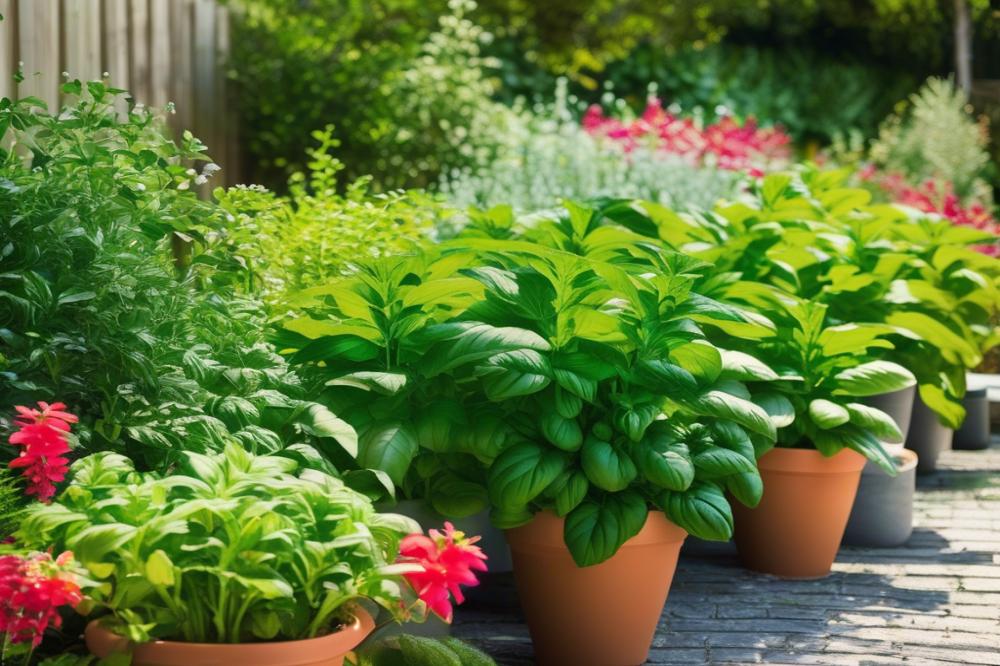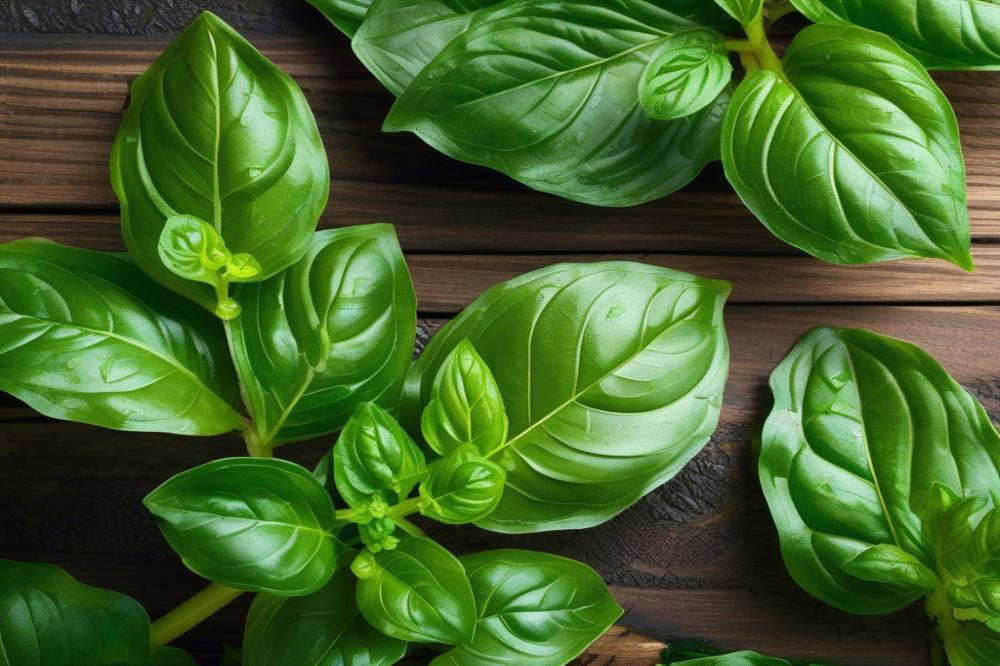Making a Natural Shift in Pest Management
In today’s world, the shift towards Natural Pest Control is vital. Using eco-friendly methods protects not just your plants but also the environment. Garden pests can cause a lot of damage, but there are solutions that are safe and effective. Turning to natural alternatives is a smart move for both novice gardeners and seasoned green thumbs.
Basil has earned a reputation as a powerful pest repellent. Its essential oil contains compounds that deter unwanted insects. Many gardeners have found success using this fragrant herb to keep pests at bay. This method is simple yet effective, tapping into the natural qualities of basil to provide protection for your plants.
Creating a DIY herbal spray is not only easy but rewarding. You’ll have peace of mind knowing that your garden care practices are safe. Homemade insecticides offer gardeners an opportunity to maintain their plants without harmful chemicals. This green approach aligns perfectly with the principles of organic pest control, emphasizing the use of natural resources without toxic effects.
The benefits of a Basil Spray extend far beyond pest management. It allows you to care for your plants in a responsible way while promoting healthy growth. As you incorporate this solution into your gardening routine, you foster a connection with nature. Eco-friendly practices are not simply a trend; they represent a deep commitment to preserving our environment for future generations.
Understanding Basil Spray


Basil acts as a formidable natural pest deterrent, making it an excellent choice for gardeners seeking eco-friendly solutions. Its strong scent is not only delightful for cooking but also incredibly effective in keeping unwanted creatures at bay. When you use basil essential oil, you are harnessing the power of nature to protect your plants without harsh chemicals.
A variety of garden pests can be repelled by this herbal spray. Insects like aphids, spider mites, and whiteflies tend to shy away from the aroma of basil. Not only will this save your precious plants, but it also contributes to a healthier garden environment. Observing your plants will reveal how effective as a homemade insecticide this approach can truly be.
Utilizing herbal sprays aligns perfectly with organic pest control practices. Your garden thrives on natural methods that respect the environment. By incorporating basil as a pest repellent, you’re adopting plant care techniques that prioritize the health of your soil and local ecosystem.
Many gardeners appreciate the value of organic solutions in their landscaping. They understand that using chemical-laden products can harm beneficial insects and the surrounding wildlife. Choosing DIY basil spray is not just a way to deter pests; it’s an act of support for sustainable gardening.
Ingredients Needed for DIY Basil Spray


To create your own effective insecticide, you will need a few key ingredients. Fresh basil leaves are the star of the show. They contain natural oils that can help repel unwanted pests. In addition, water is crucial for mixing everything together. You’ll also want to grab some basil essential oil. This concentrated form packs a powerful punch in pest repellent properties.
If you want to take your spray to the next level, consider adding a few optional ingredients. A mild soap can enhance the mixture, helping the spray adhere to the plant leaves. Vinegar, on the other hand, can provide an extra layer of deterrent against specific pests. These additions can make your herbal spray even more effective in your gardening efforts.
Choosing organic ingredients is not just a trend; it’s important for successful plant care. Organic pest control measures protect your garden without harsh chemicals. By using natural materials, you help maintain a healthy ecosystem. This choice is eco-friendly and safe for your family, pets, and beneficial insects. Why bother with artificial pesticides when homemade solutions can be just as powerful?
Step-by-Step Guide to Making Basil Spray


Creating your own herbal spray for Natural Pest Control can be both fun and rewarding. Follow these straightforward steps to prepare your DIY pest repellent. Starting with fresh basil makes a difference in the spray’s effectiveness.
Preparing the Spray
The first step is gathering your materials. You will need fresh basil leaves, water, and a small spray bottle. Aim for about two cups of fresh basil leaves. Wash the leaves thoroughly to remove any dirt or insects.
Next, chop the basil leaves to release their oils. Place the chopped leaves in a pot and cover them with 2 cups of water. Bring the mixture to a boil, then lower the heat and simmer for about 20 minutes. By simmering, you help extract the essential oils from the basil. Afterward, let it cool completely.
Once cooled, strain the liquid into your spray bottle. Make sure to get rid of any solid basil pieces. What you are left with is a potent herbal spray!
Tips for Extracting Essential Oils
To make this process even more effective, consider crushing the leaves further before boiling. Breaking down the plant material increases oil release. Alternatively, using a blender to puree the basil with water can also work well.
Proper Ratios of Ingredients
Mixing the right amounts is crucial for effectiveness. The recommended ratio is about 1 part basil extract to 3 parts water when filling your spray bottle. If you feel your mixture needs to be stronger, adjusting to a 1:2 ratio might help combat tougher garden pests.
Safety Measures
Keep in mind that using any homemade insecticide requires caution. Always wear gloves when handling fresh basil to avoid skin irritation. If using essential oils, dilute them properly to prevent any reaction. Before applying your herbal spray to your plants, test it on a small area first. This ensures it does not harm your beloved greens.
Additionally, store the mixture in a cool, dark place to maintain its potency. It’s best to use the spray within a week. Fresh is always best when it comes to plant care!
How to Use Basil Spray Effectively


Best Practices for Applying the Homemade Insecticide
Always test your DIY basil spray on a small area first. This helps ensure your plants won’t react negatively. Apply the herbal spray in the morning or late afternoon when temperatures are cooler. Avoid doing this in direct sunlight to prevent potential leaf burn. Shake the spray bottle well before each use. It mixes the ingredients thoroughly for better pest control.
Recommended Frequency of Application for Optimal Pest Control
Reapply the homemade insecticide every 5-7 days during peak pest season. Frequent applications can be beneficial if pests are persistent. After heavy rain or watering, make sure to spray again. Consistency is key for maintaining effective protection against garden pests.
Tips on Which Plants Benefit Most from Basil Spray
Most vegetables and herbs thrive with an herbal spray treatment. Tomatoes and peppers often show great improvement in pest resistance. Fragile plants like lettuce may also benefit from this organic pest control solution. Basil spray works well for any plants that attract aphids or spider mites. Regular application can lead to healthier plants overall.
How to Store the Basil Spray for Long-Term Use
Keep the spray in a cool, dark place to maintain its potency. A well-sealed container will help preserve its effectiveness. If you notice a change in color or smell, it’s best to make a fresh batch. Label your container with the date you mixed it. This way, you’ll always know its age. Make small amounts to avoid waste; the fresh spray works better than old mixtures.
Additional Herbal Remedies for Pest Control
Exploring other herbal sprays can enhance your pest control efforts. Alongside basil spray, consider using neem oil, peppermint extract, or garlic-infused water. Each of these options provides a natural approach to combatting garden pests.
Integrating various organic solutions can yield better results. When used together, different remedies target a broader range of insects. This diversity helps strengthen your defenses against invaders that threaten your plants.
Creating a diverse eco-friendly pest control strategy is simple. Start by mixing different herbal sprays in your routine. For instance, a combination of rosemary and thyme oils can act as a potent pest repellent.
Another idea is to utilize essential oils. Basil essential oil mixed with water can be a homemade insecticide that deters unwanted critters. Spraying this solution on your plants can provide added protection with a delightful scent.
Gardening can be more fruitful when you adopt a holistic approach. Exploring various options allows you to tailor your pest management to suit specific challenges in your garden. Don’t hesitate to experiment with your plant care regimen and discover what works best for you.
Moreover, consider incorporating companion planting into your strategy. Some plants naturally repel certain insects while attracting beneficial ones. By combining these methods, you harness nature’s power for effective organic pest control.
By using multiple natural remedies, you minimize reliance on chemicals. This method protects the environment and promotes healthier gardening practices. Engage with your garden by leveraging these eco-friendly techniques for a vibrant, pest-free oasis.
Wrapping Up Your Natural Pest Control Journey
Using a homemade basil spray for pest control offers numerous benefits. It acts as an effective pest repellent, keeping unwanted insects at bay without the dangers of harsh chemicals. You’ll feel good knowing your plants are safe for you, your family, and the environment. Every gardener deserves a healthy green space where nature thrives.
Adopting organic gardening practices benefits not just your garden but also the ecosystem around you. Switching to DIY methods encourages a hands-on approach. You’ll not only save money but gain a deeper understanding of your plants and their needs. This connection can make gardening a more enjoyable and rewarding experience.
Staying committed to plant care through eco-friendly methods is essential in today’s world. Embracing such practices helps preserve biodiversity. When you cultivate your garden naturally, you contribute to healthier soil and cleaner air. Remember, every little effort counts in the fight against pests.
Incorporating natural solutions like this basil spray can transform your gardening experience. It’s about more than just keeping pests away; it’s a step toward sustainable living. So, roll up your sleeves, start experimenting, and watch your garden flourish without the use of synthetic chemicals. Happy gardening!



